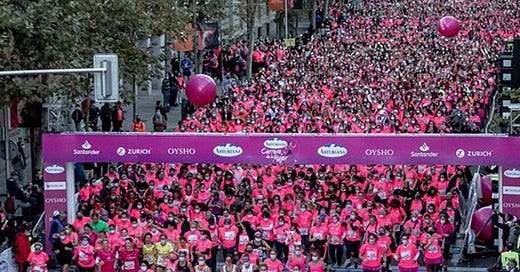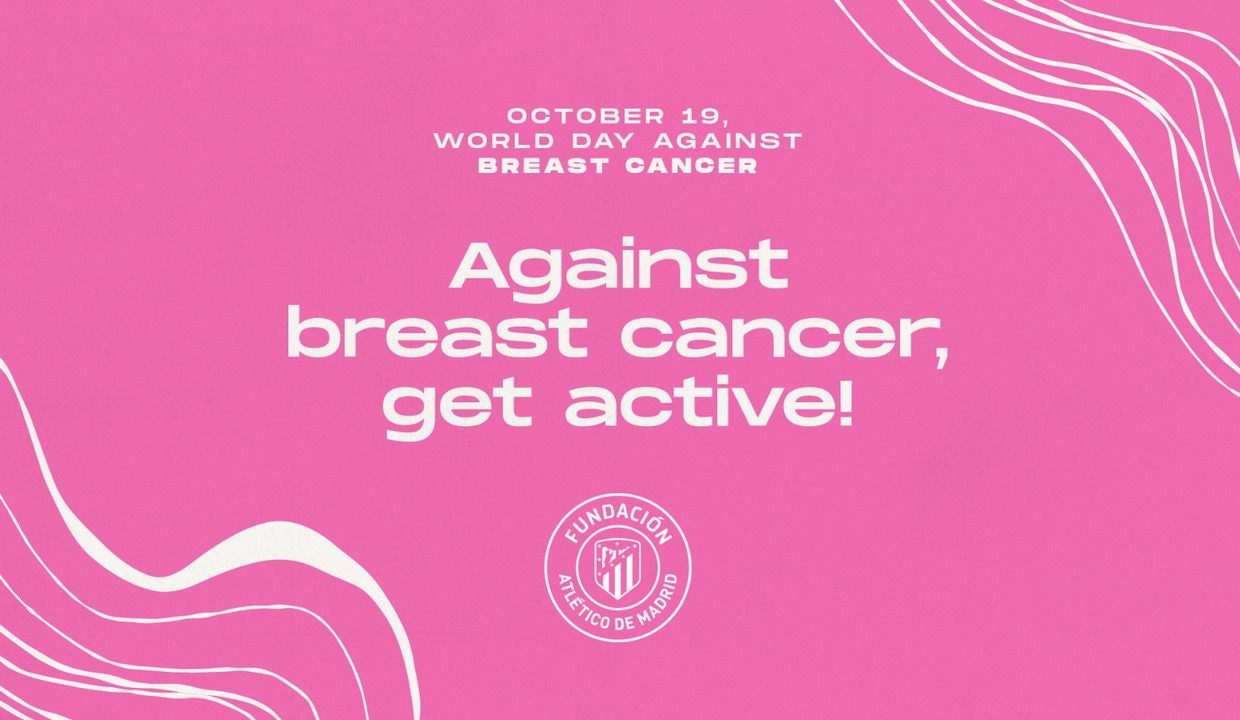It is breast cancer awareness month. My peripheral vision is strewn with pink ribbons. In Madrid, these are pinned on trees, painted on posters, stretched across T-shirts. This is also the month that marks a year since my mastectomy, following a stage-2 breast cancer diagnosis. I feel a twang of guilt at having failed to run a race in support of the cause yet. Worse, I haven’t even posted a video extolling the virtues of regular mammograms.
Breast cancer run in Madrid, October 2022
None of which is to say that cancer has left me curmudgeonly or isolated. The intellectual buzz this last year might have been about Artificial Intelligence’s threat to humanity, but for me it has been a time of discovering how the exquisite fragility of being human binds us in a communion that is robust because of its collective vulnerability. Being open about my diagnosis has meant that the nodes connecting me to the larger community of people with experience of illness, and the still larger one, of the broken and imperfect, have been lit into a twinkling constellation of care.
Vulnerability is a sorority of long forgotten-primary school classmates, acquaintances from one of life’s previous iterations, the cousins of friends and the friends of cousins. We are all, I have discovered, in various stages of being blindsided, sad or accepting of the decay of our mortal flesh – for if we are human, decay we will.
I am currently reading a book by Maria Popova, Figuring. It is a complex read, at the intersection of poetry and science, biography, and philosophy. Amongst the brilliant cast of intellectually striving characters brought to life by Popova, is Caroline Herschel, the world’s first professional female astronomer, discoverer of eight comets and calculator of the locations of 2,510 nebulae. Herschel also suffered from pain for almost the entirety of her life, having barely survived typhus at the age of eleven, an affliction that left her half blind and stunted.
Popova quotes from a letter that an 81-year-old Herschel wrote to her niece, “My complaint is incurable, for it is a decay of nature…What a shocking idea it is to be decaying. decaying!”
Popova concludes, “Our psychology (today) has remained just as vulnerable to the shock of our mortality, the emotional upheaval of which endures unpalliated by reason.”
For me, that upheaval has calmed from oxygen masks-dropping-panic&pray levels, to the fasten-your-seatbelts-and-refrain-from-visiting-the-lavatories stage. I can contemplate death now, if not quite with Buddhist equanimity, at least without avoidance.
Where does that leave me? Somewhere that is at once sadder and happier than Before Cancer. The companion of serious illness is a loss of innocence; of that childlike sense that life is stable and reliable, that our being is substantial, solid. But to be ill is also to gain a sense of clarity.
I am fierce with an awareness about the need to double down on the big questions of what gives life meaning, what constitutes joy, what is good, what to regret and what to discard without it.
From this vantage point, BC life almost feels anesthetized. It was certainly less painful, in both literal and metaphorical ways, but also, it was less vital. For it is only the fact of our inevitable ending that rescues us from banality.
If we are lucky our life is like the cherry blossom. We blaze in brief beauty. If not, we are like the cicadas of Japan’s high summer: noisy, unloved and very soon -dead.
I am put in mind of the haiku master, Matsuo Basho’s (1644-1694) riffs on these gossamer-winged cockroaches:
Nothing in the cry
of cicadas suggests they
are about to die.
And also:
Lonely silence,
a single cicada’s cry
sinking into stone.
I suppose what cancer has made me alive to is mono no aware – the Japanese concept that alludes to the pain of the finiteness of things, laced with the knowledge that transience is an essential part of their beauty.
Basho wrote this of sakura:
Between our two lives
there is also the life of
the cherry blossom.
My last scan was cancer-clear. The chemo is over. My breast has been implanted back into a feminine shape. My hair, brows, and lashes have reappeared like ageing stars making a career comeback to nostalgic cheers from well-wishers.
A newly hairy Pallavi
“So, you’re OK now, right?” ask friends. There are some questions, however well meant, that you simply cannot answer.
However, and this is my contribution to #breastcancerawaremessmonth, I can tell you to be sure to get a mammogram asap
Oh, and becoming of a paid subscriber of the Global Jigsaw is a good idea too!
With much affection y hasta pronto,
Pallavi







Exquisitely written. Pallavi, I have been interviewing cancer survivors for a magazine published by a breast cancer surgeon, but none of them, including the celebrities, have put it as eloquently as you.
And in your lines about the finiteness of things and the transience of all beings, the universe is sending me a message as I overthink leaving a dead end underpaid job to write for myself.
So thank you, and god bless. Hope the crab never visits you ever again. Take care
‘for if we are human, decay we will’…a dark topic and you made it a pleasant read!